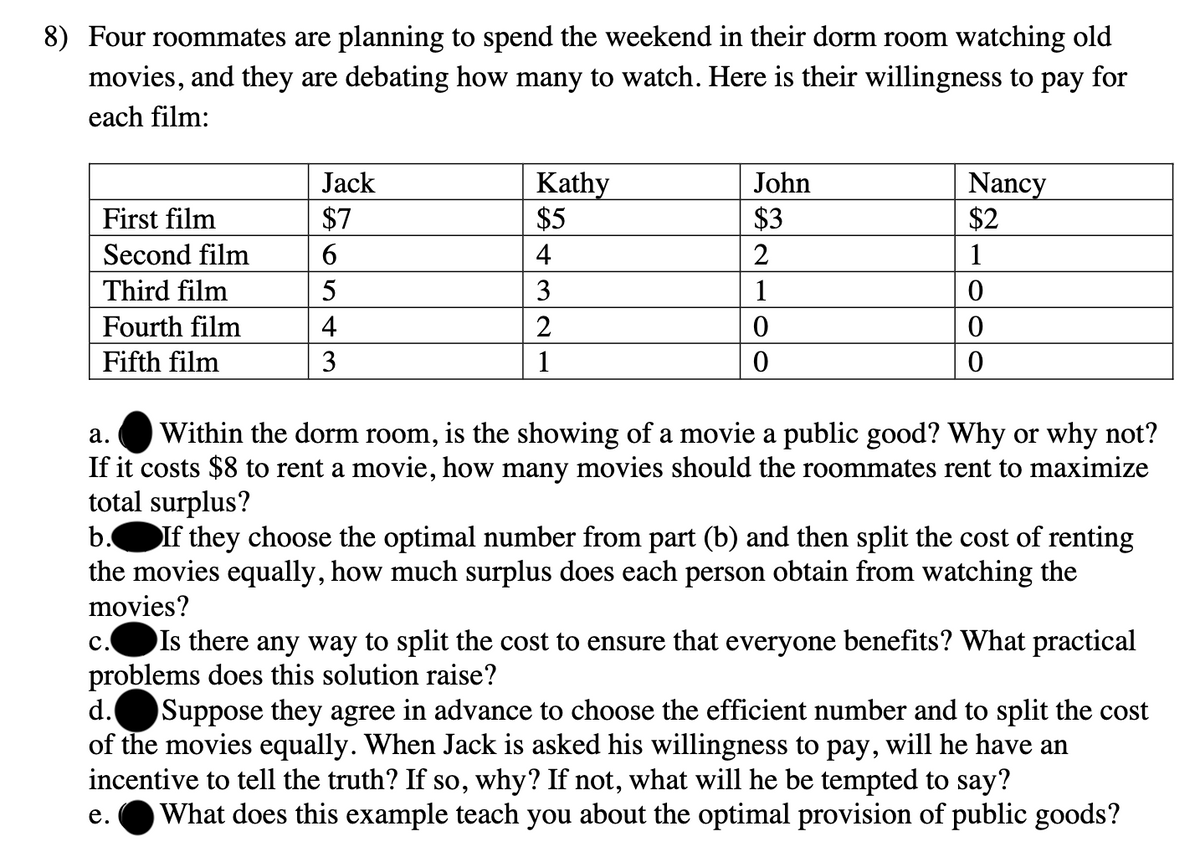8) Four roommates are planning to spend the weekend in their dorm room watching old movies, and they are debating how many to watch. Here is their willingness to pay for each film: First film Second film Third film Fourth film Fifth film Jack $7 5 4 3 C. Kathy $5 4 3 2 1 John $3 2 1 0 0 Nancy $2 1 0 0 a. Within the dorm room, is the showing of a movie a public good? Why or why not? If it costs $8 to rent a movie, how many movies should the roommates rent to maximize total surplus? b. If they choose the optimal number from part (b) and then split the cost of renting the movies equally, how much surplus does each person obtain from watching the movies? Is there any way to split the cost to ensure that everyone benefits? What practical problems does this solution raise? d. Suppose they agree in advance to choose the efficient number and to split the cost of the movies equally. When Jack is asked his willingness to pay, will he have an incentive to tell the truth? If so, why? If not, what will he be tempted to say? e. What does this example teach you about the optimal provision of public goods?
8) Four roommates are planning to spend the weekend in their dorm room watching old movies, and they are debating how many to watch. Here is their willingness to pay for each film: First film Second film Third film Fourth film Fifth film Jack $7 5 4 3 C. Kathy $5 4 3 2 1 John $3 2 1 0 0 Nancy $2 1 0 0 a. Within the dorm room, is the showing of a movie a public good? Why or why not? If it costs $8 to rent a movie, how many movies should the roommates rent to maximize total surplus? b. If they choose the optimal number from part (b) and then split the cost of renting the movies equally, how much surplus does each person obtain from watching the movies? Is there any way to split the cost to ensure that everyone benefits? What practical problems does this solution raise? d. Suppose they agree in advance to choose the efficient number and to split the cost of the movies equally. When Jack is asked his willingness to pay, will he have an incentive to tell the truth? If so, why? If not, what will he be tempted to say? e. What does this example teach you about the optimal provision of public goods?
Principles of Economics 2e
2nd Edition
ISBN:9781947172364
Author:Steven A. Greenlaw; David Shapiro
Publisher:Steven A. Greenlaw; David Shapiro
Chapter13: Positive Externalities And Public Goods
Section: Chapter Questions
Problem 24P: Assume that the marginal private costs of a film producing fuel-efficient can; is greater than the...
Related questions
Question
I need help with d and e

Transcribed Image Text:8) Four roommates are planning to spend the weekend in their dorm room watching old
movies, and they are debating how many to watch. Here is their willingness to pay for
each film:
First film
Second film
Third film
Fourth film
Fifth film
Jack
$7
6
C.
4
Kathy
$5
4
3
e.
2
1
John
$3
2
1
0
0
a.
Within the dorm room, is the showing of a movie a public good? Why or why not?
If it costs $8 to rent a movie, how many movies should the roommates rent to maximize
total surplus?
b. If they choose the optimal number from part (b) and then split the cost of renting
the movies equally, how much surplus does each person obtain from watching the
movies?
Nancy
$2
1
0
0
0
Is there any way to split the cost to ensure that everyone benefits? What practical
problems does this solution raise?
d.
Suppose they agree in advance to choose the efficient number and to split the cost
of the movies equally. When Jack is asked his willingness to pay, will he have an
incentive to tell the truth? If so, why? If not, what will he be tempted to say?
What does this example teach you about the optimal provision of public goods?
Expert Solution
This question has been solved!
Explore an expertly crafted, step-by-step solution for a thorough understanding of key concepts.
Step by step
Solved in 2 steps

Knowledge Booster
Learn more about
Need a deep-dive on the concept behind this application? Look no further. Learn more about this topic, economics and related others by exploring similar questions and additional content below.Recommended textbooks for you

Principles of Economics 2e
Economics
ISBN:
9781947172364
Author:
Steven A. Greenlaw; David Shapiro
Publisher:
OpenStax

Principles of Microeconomics
Economics
ISBN:
9781305156050
Author:
N. Gregory Mankiw
Publisher:
Cengage Learning

Essentials of Economics (MindTap Course List)
Economics
ISBN:
9781337091992
Author:
N. Gregory Mankiw
Publisher:
Cengage Learning

Principles of Economics 2e
Economics
ISBN:
9781947172364
Author:
Steven A. Greenlaw; David Shapiro
Publisher:
OpenStax

Principles of Microeconomics
Economics
ISBN:
9781305156050
Author:
N. Gregory Mankiw
Publisher:
Cengage Learning

Essentials of Economics (MindTap Course List)
Economics
ISBN:
9781337091992
Author:
N. Gregory Mankiw
Publisher:
Cengage Learning

Principles of Microeconomics (MindTap Course List)
Economics
ISBN:
9781305971493
Author:
N. Gregory Mankiw
Publisher:
Cengage Learning

Principles of Economics (MindTap Course List)
Economics
ISBN:
9781305585126
Author:
N. Gregory Mankiw
Publisher:
Cengage Learning

Principles of Economics, 7th Edition (MindTap Cou…
Economics
ISBN:
9781285165875
Author:
N. Gregory Mankiw
Publisher:
Cengage Learning